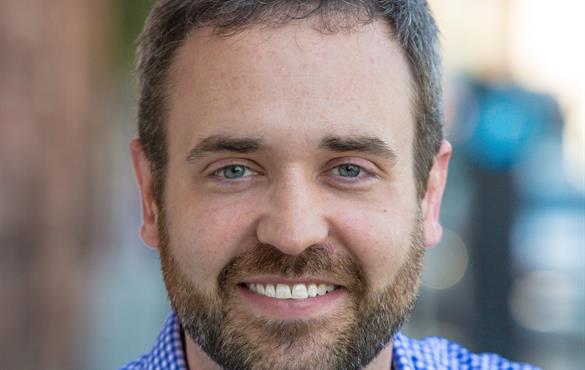Alumnus Johns’ search for an idea led him to KeepTruckin
Alumnus Ryan Johns meeting needs of trucking industry through KeepTruckin

To be successful, the former CSE student says to supplement the classroom with real-world projects
As a programmer, Ryan Johns was always looking for problems to solve — he just needed the right problem. Five years after graduating from Washington University in St. Louis, he found the right problem and the right partner.
Johns, who earned bachelor's and master's degrees in computer science in 2008, is now co-founder and chief technical officer of KeepTruckin, a privately-held company that provides electronic logging devices for long-haul trucks. The fast-growing company has been named among the top startups to watch in 2019 by venture capital investors, according to Inc. magazine. It was named to Forbes' list of 2018 top 100 cloud companies and continues to attract funding through venture capital funds, most recently a $149 million investment in late April.
In advance of a federal mandate requiring over-the-road trucks to have electronic logging devices to replace paper logbooks, Johns and his colleague, Shoaib Makani, co-founder and CEO of KeepTruckin, got together to provide a solution.
"Trucking is one of the largest industry employers in the country," he said. "We wanted to come up with a way to modernize the way fleets maintain compliance and ultimately help shippers and carriers find each other. There are a lot of operational inefficiencies in the industry, and we realized we had a real opportunity on the back of the mandate to connect what was a previously fragmented and disconnected industry. There was a clear route toward this major opportunity."
But their business model is a bit unusual — they provided the product for free, a method he learned working in advertising technology (ad tech) after leaving WashU. KeepTruckin survived its first two years on seed funding.
"My co-founder also comes from that background, so we played the long game," said Johns, who delivered the Mindlin Lecture in February. "We give something away for free, gain users, gain market share, then be ready for the major regulatory shift when it hit. It takes a while and you have to be patient, but it definitely paid off in the end."
KeepTruckin provides logging devices to about a quarter-million trucks that allow drivers to track hours on and off of the road, fuel use, GPS tracking and video monitoring. The company manufactures its own hardware and develops all the software with its roughly 1,200 employees in the United States and Pakistan. Its headquarters is in San Francisco with an engineering office in Buffalo, New York, and a new office in Nashville, Tennessee, to serve as a sales office and a hub for the southeastern U.S., where trucking is a big industry. The Nashville office is looking to hire about 300 people over the next 18 months, he said.
The work is a perfect fit for Johns, who quickly learned through two student internships — including one at Lehman Brothers before its collapse in 2008 — that working at a big company that required wearing a suit every day was not for him.
"Every one of my positions after college has been in small companies or startups, and I've found them through somebody I've known or some inside connection," he said. "I really like a small company because you get so much more impact, and your ability to learn is so much greater."
And Johns is still learning as the company looks to expand beyond the U.S. and beyond electronic logging devices. Continuing to learn outside the classroom is something he recommends to WashU students.
"Find a real-world programming project to do on your own," he said. "You are forced to learn the whole development lifecycle, and that gives you a leg up when joining a company. A good way to get exposure to web technology is to build a website or blog or build a service that you would find useful in your personal life."
Johns said the company is in hiring mode and is looking for McKelvey Engineering students as interns and graduates as employees.
"We're in a position where we can support new graduate learning," he said.



